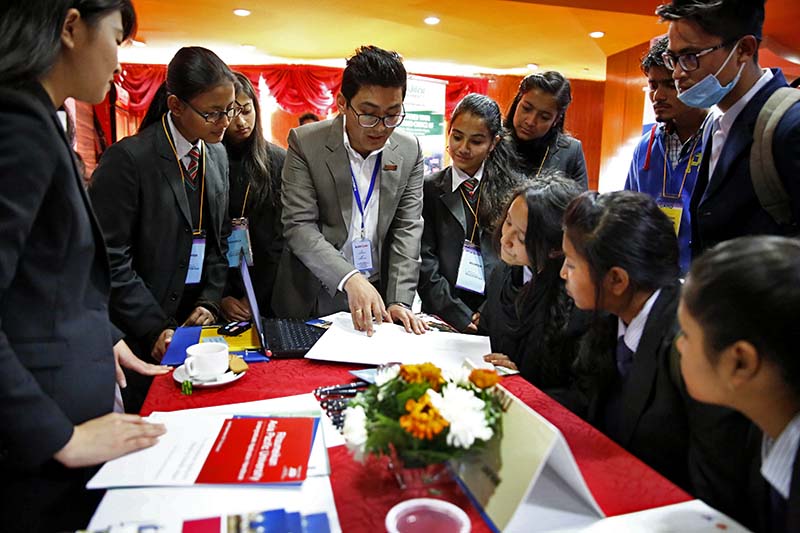Is going abroad the only answer?
Kathmandu
More and more Nepali students are going abroad to pursue their studies. But is it really a foreign degree luring them, or is it something else? According to the statistics at the Ministry of Education for 2015/16, 32,889 students have gone abroad to study, whereas in the year 2014/15, 30,696 students went abroad for the same. The number of students going abroad is increasing by the year.
It is common to see students enrolling for IELTS, TOEFL, GMAT and language classes to go either to Europe, America and other countries.
Billions of rupees have been invested in our education system. In Tribhuvan University, Kathmandu University, Purbanchal University, and colleges affiliated to these universities — a huge amount of money has been invested. However, students are opting to go abroad, and they go one way or the other.
The question that arises here is — can our colleges and universities not provide quality education?
Numerous education fairs are held in the Capital about studies abroad. These fairs aim to provide information to students about studies in their choice of university abroad and to help them choose desirable courses at affordable costs.
Rozwol Karmacharya, 22, from Maitidevi, is one such student aspiring to study abroad. After completing his Bachelor in Hotel Management from Nepal Academy of Tourism and Hotel Management, “I’m planning to do MBA in Hospitality Management in the US. If I get an American degree, I can get job anywhere.”
Nineteen-year-old Shyam Kishore Shah from Baneshwor is another visitor to such a fair and shared, “I’m going to join Sharda University in India for BE.” On being asked why not study here, he said, “I heard there is good accommodation and environment for students and an affordable fee too in that university.”
Reasons to leave
Educationist Prof Dr Bidya Nath Koirala listed out several causes that encourage Nepali students to opt for studies abroad.
The first cause he pointed out was the generation gap. “The huge age gap between parents and children, mostly in uneducated parents and educated children — the children choose to leave and study abroad. And going abroad is taken as a mark of respect. If someone has gone abroad, it automatically increases his/her level. Also, they think they should earn money. There is an assumption that if we earn $1 there, it will be converted to Rs 100 here. The other reason is the aspiration to do something. But some students go abroad just to study also.”
Conditions of private institution
Prof Dr Koirala also claimed that private institutions have focused on decorations only. “They are unable to provide quality education to compete in the open markets. Teachers’ role is ‘all in all’, but knowledge-wise they are out-dated. They teach with an exam-oriented mindset. They pass students through nepotism and favouritism. Hence, students are unable to rely on their teachers here and hence forced to seek other choices.”
He also pointed out the mentality of parents and students. “They want an education which will give cash returns immediately. After studies, they must get a good job immediately.”
Government views
As per Spokesperson of Ministry of Education Dr Hari Prasad Lamsal, “Education is not one reason that students are leaving to go abroad. Students aim to reach those countries to study as well as to earn money.”
He insisted the government has been offering BBA, MBA, Engineering and MBBS courses at affordable fees and there are affiliations between Nepali and foreign universities/colleges too.
Role of consultancies
There have been cases of students who went abroad and were trapped in disqualified institutions and colleges. Due to lack of governing and monitoring bodies, many education consultancies are cheating such students. There are still a large number of counsellors who do not
have a certificate to counsel students. On the other hand, students totally depend on consultancies for information and they hardly care to get information on their own.
Dwiraj Sharma, Executive Chairman of Alfa Beta Group, claimed that his institution does not attend students who have less than 60 per cent marks. However, one observed at a counselling for a student that the counsellor involved assured that the student would easily get a visa. This student had 55 per cent on his marksheet.
“Chinese and Indian students go to Europe, America and study hard for better education. But our students go there to earn money rather than study,” he explained.
What is the solution?
It is a student’s right to study in the country of their choice as long as they have a ‘No Objection’ letter from the Nepal government. But the problem is — are they really serious about studying? Or we are too late to address the problem?
As per Prof Dr Koirala, “Holding exams and declaring results on time, the course taught should be designed by the teacher him/herself, the teacher should be updated about the subject s/he is teaching, and students should have the choice to change subjects if they are unable to understand it. Along with this the leadership of educational institutions should be strong. These steps will solve the problem.”
Agreeing with him, Dr Lamsal said, “Rules and regulations in colleges/universities should be strengthened. Exams and results on time, less politicisation, no strikes will do, and they should offer newer courses and revise the old ones.”






